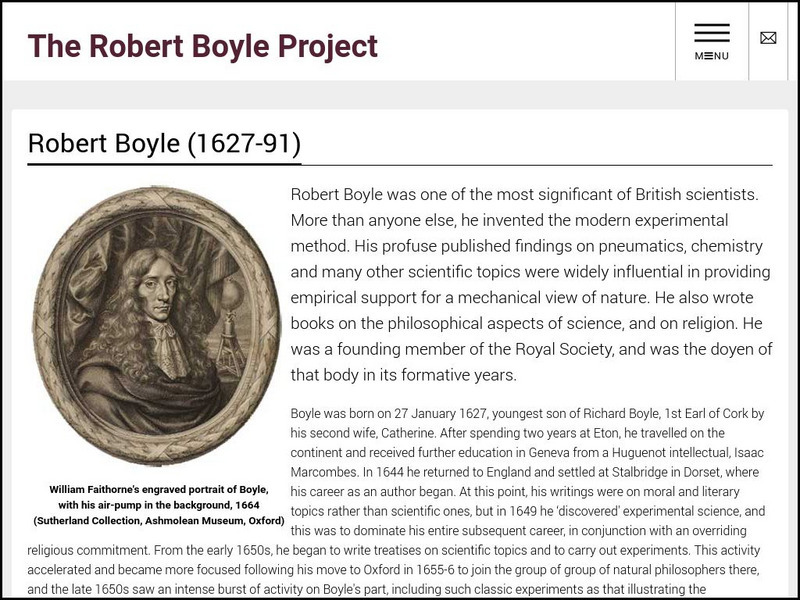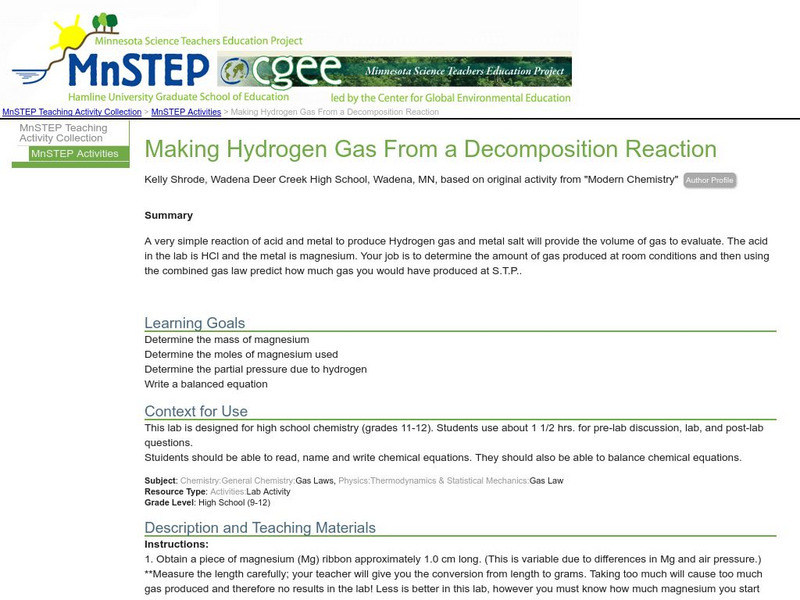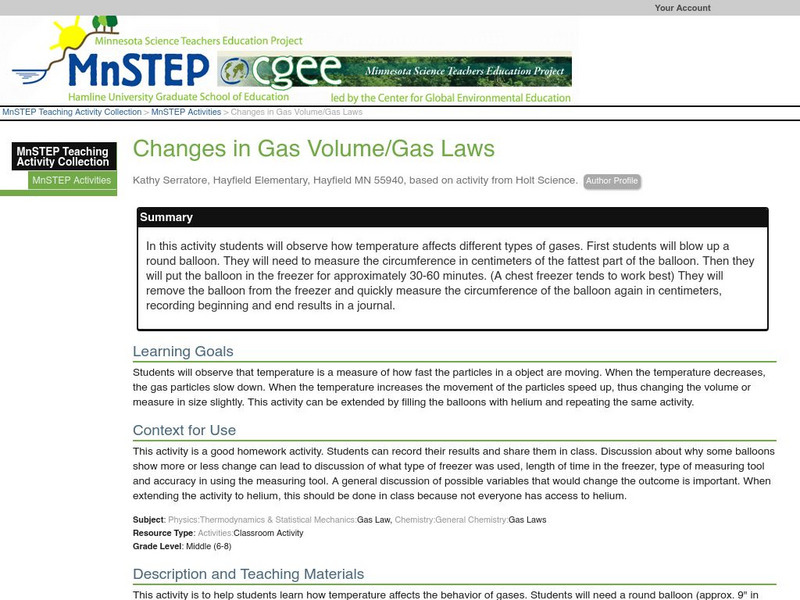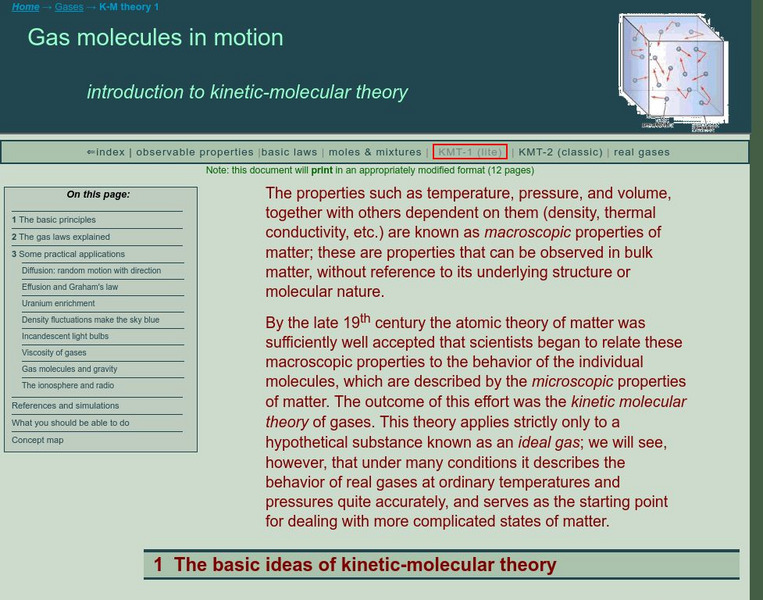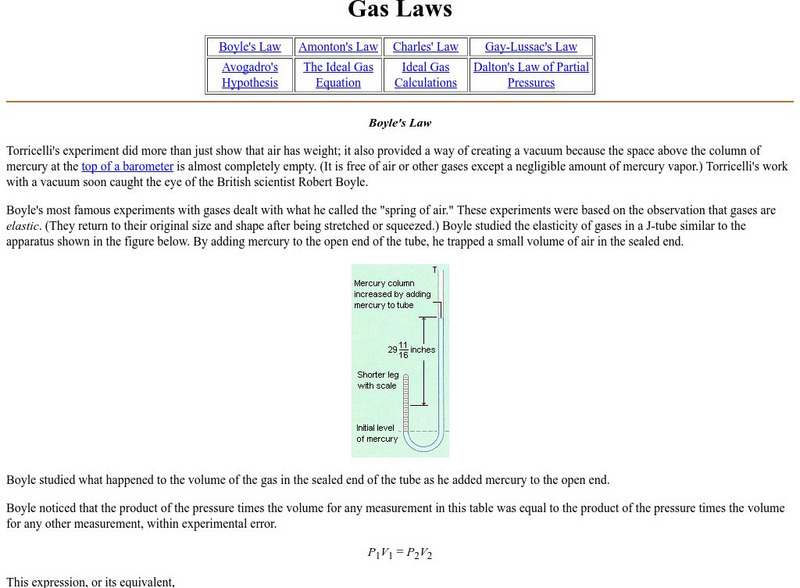Chem Tutor
Chem Tutor: Graham's Law of Diffusion (Or Effusion)
A decent site with a good explanation of Graham's Law of diffusion. Includes the formula for this law and some sample problems at the bottom of the page.
Texas Education Agency
Texas Gateway: Atomic and Molecular Explanation of Pressure and Temperature
Learn how to calculate the kinetic energy of a gas molecule, describe the relationship between the temperature of a gas and the kinetic energy of atoms and molecule, and describe the distribution of speeds of molecules in a gas. The...
Other
The Robert Boyle Project, University of London
Official homepage of Robert Boyle (1627-1691 CE). The site is very comprehensive in its information about Boyle. The site has links to a bibliography, his works, correspondence, etc.
Georgia State University
Georgia State University: Hyper Physics: Ideal Gas Law
This site defines and discusses the ideal gas law. The concept of state variables is explained and the various state variables are identified. Links to further information is available.
Concord Consortium
Concord Consortium: Molecular Workbench Showcase: Chemistry, Thermodynamics
Explore some virtual experiments on gases and vapor pressure, the Maxwell speed distribution, the barometric formula, and heat and temperature.
Georgia State University
Georgia State University: Hyper Physics: Ideal Gas Law Calculations
A page containing an interactive JavaScript form which allows the visitor to investigate the relationship between various state variables. Visitors input values of a few variables and observe the effect upon the other variables. Options...
Chiral Publishing
Chiral Publishing: An Introduction to Chemistry: Avogadro's Law: Volume Number of Particles
Animation depicting Avogadro's Law or how the volume of a gas is affected by the number of gas particles. See what happens to the volume of a gas when the pressure and temperature stay constant.
Texas Instruments
Texas Instruments: Gas Lab
Students determine the molecular weight of a pure gas in a balloon by using gas laws and trapping the gas in a glass bottle. Students watch the instructor demonstrate the lab on day one. On day two and three they practice the lab. On day...
Science and Mathematics Initiative for Learning Enhancement (SMILE)
Smile: Four Air Pressure Labs
Four lab exercises from the Illinois Institute of Technology demonstrating air pressure are given.
University of Nebraska
David Brooks: Henry's Law Experiment
At this site learn about Henry's law through this hands-on experiment. Lab instructions are complete including step-by-step pictures an worksheet.
Science Education Resource Center at Carleton College
Serc: Molar Volume of a Gas Determined via a Reaction
During this experiment, students will react magnesium with hydrochloric acid to produce hydrogen gas which is collected inside a flask that has a Vernier Gas Pressure Sensor connected to it in order to determine the molar volume of a...
Science Education Resource Center at Carleton College
Serc: Making Hydrogen Gas From a Decomposition Reaction
A very simple reaction of acid (HCl) and metal (magnesium) to produce Hydrogen gas and metal salt will provide the volume of gas to evaluate. Students will determine the amount of gas produced at room conditions and then using the...
Science Education Resource Center at Carleton College
Serc: Observing the Effect of Temperature on Change of State and Gas Pressure
This lab serves as a short introduction to both changes in state and air pressure/the gas laws. The students will heat a small amount of water in an aluminum can. They will then invert it in a bucket of cold water and crush the can using...
Science Education Resource Center at Carleton College
Serc: Mini Lab: Investigating Gas Laws
In this activity, students investigate two gas laws: Charles and Boyle's. They will determine the relationship between gases and certain variables (temperature, volume and pressure), then watch a demonstration and determine what...
Science Education Resource Center at Carleton College
Serc: Changes in Gas Volume/gas Laws
In this activity students will observe how temperature affects different types of gases. First students will blow up a round balloon. They will need to measure the circumference in centimeters of the fattest part of the balloon. Then...
Simon Fraser University
Chem1 Virtual Textbook: Pressure Volume Relations and Boyle's Law
The General Chemistry Virtual Textbook, or Chem 1, is broken into several sections covering various aspects of topics related to chemistry. This section deals specifically with Boyle's Law and its relation to other gas laws.
Simon Fraser University
Chem1 Virtual Textbook: Mixtures of Gases
The General Chemistry Virtual Textbook, or Chem 1, is broken into several sections covering various aspects of topics related to chemistry. This section deals with gases and specifically mole fractions and volumes.
Simon Fraser University
Chem1 Virtual Textbook: Kinetic Molecular Model
The General Chemistry Virtual Textbook, or Chem 1, is broken into several sections covering various aspects of topics related to chemistry. This section deals with the basic components of the Kinetic-Molecular Theory in addition to...
Simon Fraser University
Chem1 Virtual Textbook: The Equilibrium Constant
With an overview of topics related to chemical equilibrium, this site provides a foundation to a study of thermodynamics and equilibrium. Included in the discussion with the equilibrium constant are topics such as equilibrium and...
Purdue University
Gas Laws
This chemistry tutorial explains the gas laws (e.g., Boyle's Law) with applications.
Crescent Public Schools
The Internet Science Room: The Gas Laws
A chemistry tutorial which explains the Gas Laws, and provides examples for further understanding.
University of Florida
Chemistry 2041 Lecture Notes: Ideal Gases
The ideal gas law is presented and explained. The derivation of other gas laws is performed. Gas behavior is explained in terms of gas laws. Excellent graphics.
Alabama Learning Exchange
Alex: Gas Laws
The teacher will perform a demonstration of imploding a coke can. We will then discuss Boyle's law. After this discussion, we will conduct the science in motion lab "Boyle's Law". Each lab group will load their graphical results into a...
Concord Consortium
The Concord Consortium: Molecular Workbench: Ideal Gas Laws
Use the links on this page to view simulations for various gas laws.




